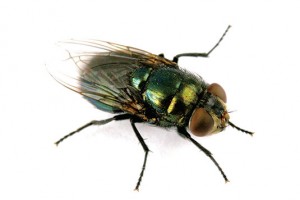Q. A business customer is finding black blow flies in its offices. A restaurant two doors away (all of the buildings are attached) recently had a rat problem. Rodenticides were used, and we were told a large number of rat carcasses were found. Could the flies be coming from the restaurant? What can we do to help our customer? ROSE M., FLORIDA
A. It’s a good bet the restaurant is the source. A residual treatment around the windows might help, because the flies tend to congregate near the windows. Additionally, provide them with a flying insect aerosol for temporary control.
Blow flies (Calliphoridae) only infect carcasses at a certain stage. The life cycle can be completed in a week or two. By now, most of the adult flies have emerged, and the problem should resolve itself. Any remaining carcasses probably cannot support blow flies.
Q. I have a small company, and I’d like to know what big companies are doing to treat offices for bed bugs. I have a government office client that complains about what it believes are bites. It is constantly asking me to treat for bed bugs. I don’t think it needs it, and I’ve never found bed bugs in that office. What’s your advice? TOM S., ALABAMA
A. My advice is not to worry about what the big guys are doing. You should be doing what you think is best for your company. That said, most companies aren’t routinely treating offices for bed bugs. Offices are not an ideal environment for bed bugs. People are usually gone during the night and seldom rest in one position for extended periods of time. Bed bugs would need to come out and forage during daylight, and then find someone who remains stationary for an extended period of time.
I suggest setting out monitors. If a bed bug or other pest is found, develop a treatment strategy. Otherwise, stick to your guns and don’t treat for something that’s not there.
Q. How long do body lice live away from the human body? A hospital wants us to spray areas where lice have been found, and we have resisted. Should we spray? FRANK D., MINNESOTA
A. My research into your question failed to present any such data. Most authorities who have written about the topic agree lice can’t live off the body for more than 48 hours. Some data suggest that once lice are removed from the host (and its heat), they quickly become immobilized and stop moving. Therefore, spraying suspect areas has little value because lice that drop from an infected person don’t go anywhere. They lie stationary and eventually die.
Therefore, a pest management professional has no role in lice control. It’s a medical condition. Bedding and clothing that were in direct contact with the person in question should be washed in hot water, and then heat dried in a dryer. The heat will kill any lice and their eggs. Such bedding and clothing can be stored in plastic bags until washed or discarded.
Email your questions about insect identification and pest management technologies and techniques to Dr. Doug Mampe, an industry consultant, at dentomol@aol.com. Your questions most likely will be printed and answered in one of Pest Management Professional’s upcoming Ask the Expert columns.

Leave A Comment